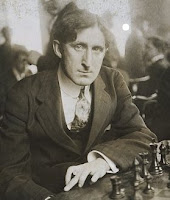 |
| Capa |
In the American National Chess Congress the top six players qualified for spots in the upcoming tournament in Havana. There was a tie for 5ht-6th places between Oscar Chajes and James H. Stapfer, but for unknown reasons Stapfer did not go to Havana. The unheralded Stapfer was born February 8, 1877 in Switzerland and at some point moved to the United States where he died at the age of 82 in 1959.
The Havana event was a double round event between the top five finishers in this tournament plus Cubans Rafael Blanco Estera and Juan Corzo. Marshall edged Capa for first by a half point.
 |
| Marshall |
In this event Capablanca won his first ten in a row before losing to Jaffe in round 11 and the a round 12 draw Chajes meant Marshall was only 1/2-point behind for their last round showdown. Capablanca, with White, played the Exchange French and Marshall soon soon had to agree to a draw giving Capa first place.
1) Capablanca 11.0-2.0
2)
Marshall 10.5-2.5
3)
Jaffe 9.5-3.5
4)
Janowski 9.0-4.0
5-6)
Chajes and Stapfer 8.0-5.0
7)
Kupchik 6.5-6.5
8-9)
Tennenwurzel and Whitaker 5.5-7.5
10-11)
Rubinstein and Kline 4.5-8.5
12)
Morrison 4.0-9.0
13)
Liebenstein 2.5-10.5
14) Zapoleon 2.0-11.0
This tournament also featured a third Rubinstein, Solomon. This
fellow though is not to be confused with Akiba's son, Salomon (Samy)Rubinstein, (born March 19, 1927 - died June, 2002, 75 years old).
Solomon was born in Poland in 1868 and moved to San Francisco around
1915 where he managed a Chess, Checker and Whist Club. He died on
November 27, 1931 in Los Angeles. According to Chessmetrics his
highest ever rating was 2414.
Another interesting player in this tournament was the tailender Louis
Zapoleon who was born in Grodno, Russia (today Belarus) on December
21, 1886 and dies at the age of 83 on December 27, 1969.
 |
| Chess table ad in 1913 American Chess Bulletin |
He was the 5th of 7 children of an optician. The family came to US in
1891 and settled in Dayton, Ohio where they rented a house for the
optical practice. Louis went to elementary school and educated as an
economist at Dayton University. He was employed in the US Department
of Agriculture (Washington, 1909-1916), US Tariff Commission
(Washington, 1917-1925) Stanford University Food Research Institute
(Palo Alto California, 1925-1935 which included a trip to Denmark in
1925 and two years in Europe 1933-1935), US Security and Exchange
Commission (Washington, 1935-1941), and the US War Production Board
(1942-1945). He authored books on agricultural economy and also left
behind the Louis B. Zapoleon Memorial Scholarship fund which is today
administered through the Cincinnati Scholarship Foundation.
He was married in 1937 to Marguerite Wykoff (1907-2003), who had
studied economics in London, did graduate work in Switzerland, and
attended the New School for Social Research in New York. She worked
for the Deptartments of Education and Labor, as well as the Pentagon.
After World War II they purchased 354 acres of land on Sideling Hill
near Berkeley Springs, West Virginia where they built a cabin and
spent weekends and summers. They retired arouns 1955 to Fort
Lauderdale, Florida, where he suffered from a stroke in 1960 and died
of heart problems in 1969. They had no children.
Zapoleon played in the Dayton Chess Club and was one of Ohio's
strongest players at the time. In 1910 he defeated Frank Marshall in
his simultaneous in the Washington Chess and Whist Club. After
joining the Capital City Chess and Checkers Club he won the club
tournament four times: 1912, 1915 and two more times). All this
qualified him to play in the American National tournament. Although
he finished last he did draw with Marshall and defeated Jaffe. His
last appearance was probably in 1926 when Emanuel Lasker held a simul
in the Mechanics’ Institute Chess Club in San Francisco where
Zapoleon was the adjudicator.

No comments:
Post a Comment